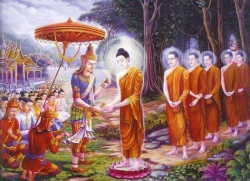Klesha-citta
klesha; (Pali: Kilesa meaning "defilements," "corruptions" or "poisons") refers to mental states that temporarily cloud the mind's nature and manifest in various forms as unskillful actions of body, speech, and mind. (The kilesha are called "The Three Poisons" in Mahayana Buddhism.) The three primary kilesha are known as mula klesha ("root obscurations"):
1) lobha: greed, lust (rāga), attachment;
2) dosa: hatred, aversion;
3) moha: delusion, sloth, ignorance (avijjā).
These three kilesas specifically refer to the subtle movement of mind (citta) when it initially encounters a mental object. If the mind initially reacts by moving towards the mental object, seeking it out, or attaching to it, the experience and results will be tinged by the lobha kilesa. Unpleasant objects or experiences are often met by aversion, or the mind moving away from the object, which is the root for hatred and anger to arise in relation to the object.
All Buddhist schools teach that through Tranquility (Samatha) meditation the kilesas are pacified, though not eradicated, and through Insight (Vipassana) the true nature of the kilesas and the mind itself is understood. When the empty nature of the Self and the Mind is fully understood, there is no longer a root for the disturbing emotions to be attached to, and the disturbing emotions lose their power to distract the mind.
